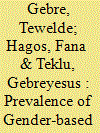| Srl | Item |
| 1 |
ID:
078276


|
|
|
|
|
| Publication |
2007.
|
| Summary/Abstract |
Migrant workers, meaning those who used to be farmers but have left rural areas and found jobs in cities as a result of economic reform and rapid development in China, have made a significant contribution to the burgeoning labor market and played an important role in speeding up the transition from a planned to a market economy. This present paper considers the economic status and social attitudes of migrant workers. It is based on the analysis of a large-scale survey in 2006, which was conducted using questionnaires and covered 28 provinces, municipalities and autonomous regions throughout the country. It was found that the income status of migrant workers depends heavily on the education and technical skills that they have developed, rather than on identity-based discrimination. Surprisingly, it was also found that those on less income and of lower economic and social status show more positive attitudes to society than those who are affluent and considered of higher social status. It is concluded that the decisive factor in attitude and behavior of migrant workers is historic rather than economic.
|
|
|
|
|
|
|
|
|
|
|
|
|
|
|
|
| 2 |
ID:
170542


|
|
|
|
|
| Summary/Abstract |
In Ethiopia, large numbers of women are at higher risk of gender-based violence and harmful traditional practices. The main aim of the study is to explore the prevalence rate of gender-based violence and harmful traditional practices against women in the Tigray region, Ethiopia. In this study, a total of 1253 women were surveyed, of which 560 were from rural areas. Further, 14 focus group discussions and in-depth key informant interviews were conducted with relevant governmental and non-governmental bodies. It was found that a significant number of married women were not asked for their permission to be married and their mate was mostly selected by their family. Among others, age was found to be a statistically significant predictor for early marriage and permission of girls to get married with an odds ratio of 0.95 and 0.97, respectively (p < 0.05). Twenty-one forms of gender-based violence and 29 forms of harmful traditional practices and stereotypes against women were identified. These practices were mostly supported by the community. While gender-based violence was found to be somewhat higher in urban areas, most of the harmful traditional practices were slightly higher in rural areas.
|
|
|
|
|
|
|
|
|
|
|
|
|
|
|
|